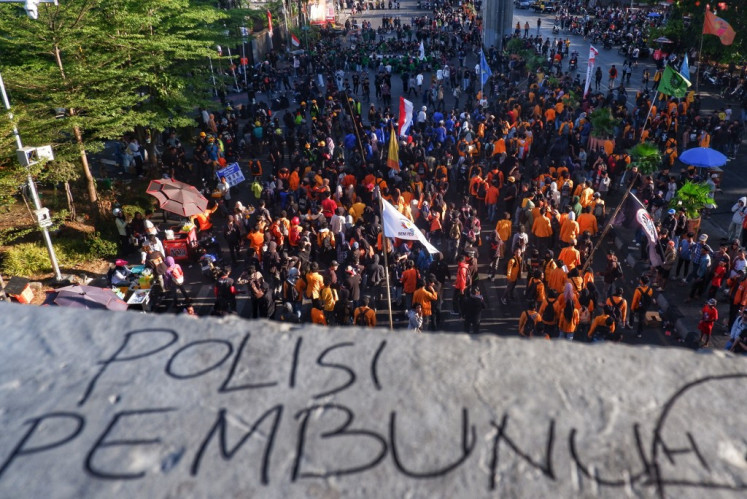Popular Reads
Top Results
Can't find what you're looking for?
View all search resultsPopular Reads
Top Results
Can't find what you're looking for?
View all search resultsBalinese Hindus commemorate good's victory over evil
For the Creator: A Balinese Hindu woman prepares offerings to commemorate Galungan Day in Gianyar, Bali, on Wednesday
Change text size
Gift Premium Articles
to Anyone
F
span class="caption">For the Creator: A Balinese Hindu woman prepares offerings to commemorate Galungan Day in Gianyar, Bali, on Wednesday. Galungan is an important feast for Balinese Hindus that is held every 210 days according to the Balinese calendar, to honor the Creator of the universe and the spirits of honored ancestors. JP/Agung Parameswara
Millions of Balinese Hindus across the island observed Galungan, to commemorate good's victory over evil, on Wednesday.
From early morning, people flocked to temples and shrines to perform prayers. Wearing their best colorful Balinese attire, they brought offerings, including many kinds of fruit, cakes and canang sari (a delicate banana leaf arrangement with petals on top).
The Jagatnatha temples in regencies across Bali were also flocked by Hindu devotees.
At Denpasar Jagatnatha temple, hundreds of people performed prayers until night. Dozens of Hindu priests from the Paiketan Pemangku Kota Denpasar association voluntarily served Hindu devotees performing prayers.
Jagatnatha Hindu priest, Jero Mangku I Made Langgeng Buana, said that people had started arriving at the temple to pray from 6 a.m. 'They are not only natives of Denpasar but also people from Buleleng and other areas of Bali who are working in Denpasar and cannot go to their hometowns for the holiday,' Buana said.
Observed every 210 days, Galungan is the celebration of dharma (virtue) over adharma (vice). According to the Purana Bali Dwipa lontar scripture, Galungan was first celebrated in Bali on the fourth full moon of the year 804 of the Balinese Hindu Saka calendar, or in 882 in the Gregorian calendar.
It says that Galungan has since been celebrated in Bali. However, more than three centuries later, Galungan celebrations were stopped by King Sri Ekajaya. According to the scriptures, for the time Galungan was not observed, calamities kept befalling the island. When King Sri Jayakasunu came to the throne in 1126 Saka, observations of Galungan recommenced.
Chairman of the Indonesian Parisada Hindu Council (PHDI) Bali chapter, IGN Sudiana, said that Galungan was the time for all Hindus to unify their senses and minds with god. 'During Galungan, Hindus are expected to gain
enlightenment toward peace,' Sudiana said.
A series of rituals take place in the lead up to Galungan. Sugihan Jawa, held Thursday last week, marked the beginning of the celebrations.
Sudiana explained that the Sugihan Jawa ritual aimed to cleanse the Earth. Based on the Sundarigama lontar manuscript, sugihan Jawa is celebrated as a purification of the deities, or bhatara. During the ritual, families cleaned ceremonial utensils, places of worship and houses to be used for Galungan prayers and celebrations.
Meanwhile, on Friday, another ritual, sugihan Bali, was performed all across the island to purify the self before performing any ritual.
The series of rituals before Galungan continued with penyekeban, penyajaan and penampahan, where people prepared offerings for the big day.
On Penampahan Galungan, celebrated Tuesday, people mostly slaughtered pigs to make lawar and other traditional Balinese food. Sudiana claimed the philosophy behind this ritual was to remind people to slaughter bad characteristics.
Galungan is also a much-awaited time to catch up with relatives, including the dead. People in northern Bali not only flocked to temples and shrines but also to cemeteries to pray to their ancestors. This tradition is specific to the people of Buleleng regency.
Family gatherings are a traditional way for many Balinese to celebrate Galungan, as many who work away from home return to perform joint prayers.
Desak Ketut Warsiki, a Buleleng native living in Denpasar with her small family, was delighted to be in touch with all her relatives in Buleleng. 'Galungan is the time to meet all the family,' the mother of one who works at a hotel in Kuta said.










